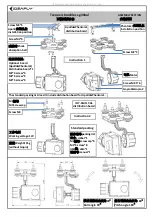
2
ther enhanced by color filters such as light blue, yellow, or red,
and the classic Moon filter to block excessive glare. Since the
BinoViewer works best for brighter objects, a light pollution
filter may only work on the brightest deep space objects. A
broadband filter, such as the Orion SkyGlow, may improve the
contrast and eliminate distracting haze from city lights.
The barlow lens also accepts filters. Simply thread them onto the
front of the barlow lens when it is installed on the BinoViewer.
solar observing
Your BinoViewer reveals copious detail on our nearest star,
the Sun. A white light solar filter placed on the front aperture of
your telescope will provide a safe view of the Sun accentuated
by the BinoViewer. These views are best enjoyed at medium
power, from 50 to 100x.
storage
Although your BinoViewer is durable, it should avoid prolonged,
unnecessary exposure to the elements. Keep the BinoViewer
in its case, with caps on when not in use. It is also recom-
mended to leave the BinoViewer in a dry place with caps off
and case open overnight to let it completely dry out.
Store the instrument in a cool, dry place; storage in a humid
environment will result in mold growth on the exterior of the
prisms that can destroy optical coatings. This is not covered
by the warranty.
cleaning
The prisms of the BinoViewer and lenses of the 2x barlow
lens are coated with anti-reflection coatings, which can be
damaged with careless handling. Avoid touching prism or lens
surfaces with your fingers or any coarse material. Clean the
prisms and lens surfaces if they get noticeably dirty. Always
use lens cleaning tissue and fluid specifically designed for
telescope optical coatings. Do not use regular tissue or fluids
made for eyeglasses or household use. Do not disassemble
the BinoViewer to clean it, with the exception of the chrome
barrel, which may be unscrewed to better access the forward
prism surface.
To clean the prism and lens surfaces, first blow air on the sur-
face with a blower bulb or compressed air to remove any large
particles. Then brush the surface with a soft lens brush and
blow air on it again to remove any dislodged particles. Put two
drops of lens cleaning fluid on a sheet of lens tissue; never put
lens cleaning fluid directly onto the prism or lens. Wipe the sur-
face gently with a circular motion, taking care to avoid undue
pressure or rubbing, which can scratch the coatings. Quickly
remove the excess fluid by wiping with a clean, dry lens tissue.
specifications
Nosepiece barrel:
1.25"
Eyepiece holders:
1.25"
Prism coatings:
Fully multi-coated
Prism type:
BAK-4
Eyepiece holders:
1.25"
Interpupillary distance: 53mm to 74mm
Barlow lens:
2x, fully multi-coated
Weight:
1 lb. 2 oz.
one-Year limited Warranty
This Orion product is warranted against defects in materials or workmanship for a period of one year from the date of purchase. This
warranty is for the benefit of the original retail purchaser only. During this warranty period Orion Telescopes & Binoculars will repair
or replace, at Orion’s option, any warranted instrument that proves to be defective, provided it is returned postage paid. Proof of pur-
chase (such as a copy of the original receipt) is required. This warranty is only valid in the country of purchase.
This warranty does not apply if, in Orion’s judgment, the instrument has been abused, mishandled, or modified, nor does it apply to
normal wear and tear. This warranty gives you specific legal rights. It is not intended to remove or restrict your other legal rights under
applicable local consumer law; your state or national statutory consumer rights governing the sale of consumer goods remain fully
applicable.
For further warranty information, please visit
www.OrionTelescopes.com/warranty.
Orion Telescopes & Binoculars
Corporate Offices: 89 Hangar Way, Watsonville CA 95076 - USA
Customer Support:
www.OrionTelescopes.com/contactus
Copyright © 2010-14 Orion Telescopes & Binoculars
All Rights Reserved. No part of this product instruction or any of its contents may be reproduced, copied, modified or adapted, without the prior
written consent of Orion Telescopes & Binoculars.
Warning:
Never look directly at the Sun with the
naked eye or with a telescope – unless you have
a proper solar filter installed over the front of the
telescope! Otherwise, permanent, irreversible eye
damage may result.




















